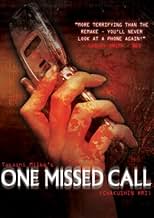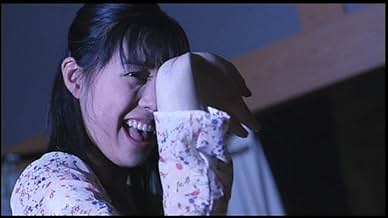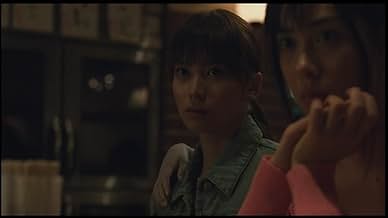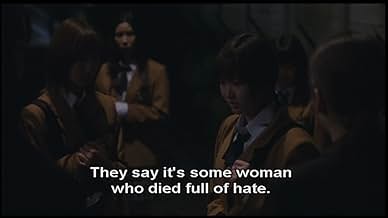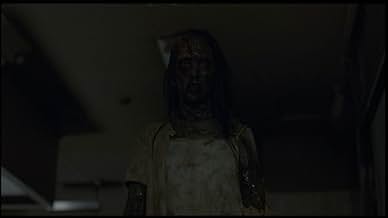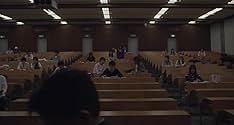Yumi tries to assuage the fears of a friend, Yoko, who has received a disturbing voice mail from herself. In the message, Yoko screams while chatting with Yumi. Three days later, the exact c... Read allYumi tries to assuage the fears of a friend, Yoko, who has received a disturbing voice mail from herself. In the message, Yoko screams while chatting with Yumi. Three days later, the exact call plays out, and Yoko dies.Yumi tries to assuage the fears of a friend, Yoko, who has received a disturbing voice mail from herself. In the message, Yoko screams while chatting with Yumi. Three days later, the exact call plays out, and Yoko dies.
- Director
- Writers
- Stars
- Director
- Writers
- All cast & crew
- Production, box office & more at IMDbPro
6.220.5K
1
2
3
4
5
6
7
8
9
10
Featured reviews
ONE MISSED CALL is an unsettling horror film with lots of scares by the cult director Takashi Mike
A high school student named Yumi Kamura finds with a group friends in a coffee bar,while her pal Yoko receives a cellular call with a rare tone which she had heard before.Into screen phone appears one missed call.The message is sent for her cellular and contains a horrible shout that sounds like her voice.Besides the call is from three days after.A time later young people receive the call are dead for terrible killing.A strange curse causes a criminal rampage among various adolescents.
The picture gets suspense,horror,shocks,grisly terror and several eerie scenes.The film displays hair-rising and horrifying images with a bit of blood and graphical gore.Mysterious and sinister atmosphere is well made by the photographer Yamamamoto. Takashi Mike(Ichi the killer) direction sometimes is actually creepy and frightening like proves the first entry ¨Dead or alive¨with the execution starring by a mobster and much more in ¨The audition¨.This horror film is inspired by ¨The ring¨with certain remembrance more even storyline coincidences.Like that and in fact happen in the most part of recently Japan horror cinema deals about an urban legend.It's the initial argument for introducing the terror in the ordinary life by means a phone.While the look is suitable spooky and eerie the plot spread to the breaking point and the final resolution results to be a little confused.The flick will like to Japan modern terror cinema enthusiastic.
The picture gets suspense,horror,shocks,grisly terror and several eerie scenes.The film displays hair-rising and horrifying images with a bit of blood and graphical gore.Mysterious and sinister atmosphere is well made by the photographer Yamamamoto. Takashi Mike(Ichi the killer) direction sometimes is actually creepy and frightening like proves the first entry ¨Dead or alive¨with the execution starring by a mobster and much more in ¨The audition¨.This horror film is inspired by ¨The ring¨with certain remembrance more even storyline coincidences.Like that and in fact happen in the most part of recently Japan horror cinema deals about an urban legend.It's the initial argument for introducing the terror in the ordinary life by means a phone.While the look is suitable spooky and eerie the plot spread to the breaking point and the final resolution results to be a little confused.The flick will like to Japan modern terror cinema enthusiastic.
The Call from Death
While in a bar with her friends, the teenager Yoko Okazaki (Anna Nagata) receives a call in her cellular with a voice mail from the future telling the date and time when she would die. On the next day, Yumi overhears a group of students talking about the urban legend that people connected in the address book of cellular are mysteriously receiving phone calls with date and time of their death in the near future. In the precise informed hour, Yoko is attacked by a supernatural force in a train station while talking to her friend Yumi Nakamura (Kou Shibasaki) by phone and dies with severed arm and leg. Yumi seeks out Kioto's boyfriend Kenji Kawai (Atsushi Ida), who also received a call, and witnesses his death in an elevator shaft. When her roommate Natsumi Konishi (Kazue Fukiishi) receives a call, Yoko befriends Hiroshi Yamashita (Shin'ichi Tsutsumi), who tells her that his sister Ritsuko (Azusa) that worked in the Child Guidance Center with abused children was the first victim of the phone call. While in the hospital, Yumi hears an asthma pump and recalls that she heard the same noise when Kenji died. They decide to investigate victims of asthma in the hospital and find the name of Marie Mizunuma and her daughters Mimiko and Nanako. They search the family together trying to save Natsumi from her fate.
"Chakushin Ari" is scary like most of the Asian horror movies, and has a promising beginning supported by a great acting and a good plot. However, the last quarter of the movie is confused, not clear, needing interpretation; therefore, the screenplay writer Minako Daira or the cult director Takashi Miike or both failed since they were not able to transmit a clear conclusion of the story to the audience. I glanced in IMDb the most different interpretations for the end of the story to ratify my opinion. My vote is six.
Title (Brazil): "Ligação Perdida" ("Missed Call")
"Chakushin Ari" is scary like most of the Asian horror movies, and has a promising beginning supported by a great acting and a good plot. However, the last quarter of the movie is confused, not clear, needing interpretation; therefore, the screenplay writer Minako Daira or the cult director Takashi Miike or both failed since they were not able to transmit a clear conclusion of the story to the audience. I glanced in IMDb the most different interpretations for the end of the story to ratify my opinion. My vote is six.
Title (Brazil): "Ligação Perdida" ("Missed Call")
Miike Fans, Be Honest
Even fans of Takashi Miike (I'm one) should be honest. He's made some bravura masterpieces like Audition and 13 Assassins but he's also churned out a lot of overlong, incoherent stinkers, of which this is one.
The premise - that people receive cell phone messages from their future selves recorded just before the moment of their deaths - had a lot of potential but Miike spaffs all that up the wall by drowning the film in slow, boring exposition and skimping on the many inventive and creepy deaths this film should have contained.
The biggest problem here is that the backstory behind why all this is happening is uninteresting and revealed in tedious chunks throughout. Instead of making the main events in the present scarier they actually make them seem more mundane. There's also a lack of clarity around how and why these events can be stopped.
Another thing that bugged me was characters behaving irrationally. The victims heard their own words recorded at the moments of their future deaths but didn't appear to make any concerted effort not to robotically repeat those same words when the time came. You'd think that it might occur to them that to be in a hotel room or a cop shop at the predicted instant of their death while definitely not uttering the words on the premonitory recording might keep them safe. But no. No one tries this and they all shamble into the jaws of doom like the pathetic, suicidal sheep they are.
This could have been a great film but it was an opportunity badly missed. Still there's plenty of other Miike to check out. It's not like the man hasn't given us anything else to choose from.
The premise - that people receive cell phone messages from their future selves recorded just before the moment of their deaths - had a lot of potential but Miike spaffs all that up the wall by drowning the film in slow, boring exposition and skimping on the many inventive and creepy deaths this film should have contained.
The biggest problem here is that the backstory behind why all this is happening is uninteresting and revealed in tedious chunks throughout. Instead of making the main events in the present scarier they actually make them seem more mundane. There's also a lack of clarity around how and why these events can be stopped.
Another thing that bugged me was characters behaving irrationally. The victims heard their own words recorded at the moments of their future deaths but didn't appear to make any concerted effort not to robotically repeat those same words when the time came. You'd think that it might occur to them that to be in a hotel room or a cop shop at the predicted instant of their death while definitely not uttering the words on the premonitory recording might keep them safe. But no. No one tries this and they all shamble into the jaws of doom like the pathetic, suicidal sheep they are.
This could have been a great film but it was an opportunity badly missed. Still there's plenty of other Miike to check out. It's not like the man hasn't given us anything else to choose from.
A well made horror, courtesy of Miike Takashi.
Most Japanese movies are considered as low-budget compared to their Hollywood counterparts. This is because their production costs are so high. However this factor does not deter Japanese creative production teams to come up with movie gems, in different genres.
In the realm of Japanese horrors for example, a studio working with a limited budget has to resort to Jaws-style direction, in which you hardly see or visualise the ghosts/monsters.
And it is through the movie's simplicity, or by not showing/explaining too much, that J-horrors have turned up the notch on the haunting and horror levels through movies such as Ring and Dark Water. Of course there are the still plenty of gorefest movies such as Suicide Circles and Ichi the Killer, the latter being a courtesy of that notorious but prolific J-director, Takashi Miike.
So it is remarkable and truly rewarding to see how Miike toned down his tastes for the twisted and perverted in One Missed Call. Furthermore he implemented his flair of storytelling through symbolisms and graphic metaphors quite nicely. Any shock/gore elements were used in such a way that they serve the movie, instead of downgrading it to a cheesy flick.
In conclusion, One Missed Call satisfies on many levels, providing you keep an open mind and just enjoy the ride. Another plus of the movie is the appearances of several gorgeous J-idols, such as Kazue Fukishii and Kou Shibasaki. Nifty!
In the realm of Japanese horrors for example, a studio working with a limited budget has to resort to Jaws-style direction, in which you hardly see or visualise the ghosts/monsters.
And it is through the movie's simplicity, or by not showing/explaining too much, that J-horrors have turned up the notch on the haunting and horror levels through movies such as Ring and Dark Water. Of course there are the still plenty of gorefest movies such as Suicide Circles and Ichi the Killer, the latter being a courtesy of that notorious but prolific J-director, Takashi Miike.
So it is remarkable and truly rewarding to see how Miike toned down his tastes for the twisted and perverted in One Missed Call. Furthermore he implemented his flair of storytelling through symbolisms and graphic metaphors quite nicely. Any shock/gore elements were used in such a way that they serve the movie, instead of downgrading it to a cheesy flick.
In conclusion, One Missed Call satisfies on many levels, providing you keep an open mind and just enjoy the ride. Another plus of the movie is the appearances of several gorgeous J-idols, such as Kazue Fukishii and Kou Shibasaki. Nifty!
Good Japanese horror movie
A good Japanese-surprise.
Was looking for something different to watch in Americanized Netherlands, and found this movie. If you have never seen any of the recent Japanese fear movies, then this one is a good compilation of the others (Ring, Dark Water, Kairo...) : strange camera angles, blurry pictures, good sound effects and music and a nice-and-somewhat logical script. I was worried about the Miike's touch, but in fact it was a surprising plus for this kind of movie, where ghosts and gore combine well. Takashi shows he knows a lot about filming methods, and also gives us an overview of the Japanese craziness about mobile phones : I can assure you that you will never look again the same way at your phone after seeing such a movie.
For the ones who have seen other Japanese horror movies, I would advise it as well, as you enjoy seeing again the same old tricks in a different context...and it works again !
So if you have the chance to have this one in a nearby theater...just try it !!
Was looking for something different to watch in Americanized Netherlands, and found this movie. If you have never seen any of the recent Japanese fear movies, then this one is a good compilation of the others (Ring, Dark Water, Kairo...) : strange camera angles, blurry pictures, good sound effects and music and a nice-and-somewhat logical script. I was worried about the Miike's touch, but in fact it was a surprising plus for this kind of movie, where ghosts and gore combine well. Takashi shows he knows a lot about filming methods, and also gives us an overview of the Japanese craziness about mobile phones : I can assure you that you will never look again the same way at your phone after seeing such a movie.
For the ones who have seen other Japanese horror movies, I would advise it as well, as you enjoy seeing again the same old tricks in a different context...and it works again !
So if you have the chance to have this one in a nearby theater...just try it !!
Did you know
- TriviaDuring the opening credit sequence, one of the cell phone ring-tones is the theme song from an earlier Takashi Miike film, Gozu (2003).
- GoofsYumi arrives at the abandoned hospital at 6:45 p.m. on April 24, and it's nighttime. On that date, sunset in Japan ranges from around 6:20 p.m. Japan Standard Time in the east, near Tokyo, to around 6:55 p.m. in the west, near Nagasaki. Depending on what part of Japan she is in, it should be daytime or twilight outside, not full dark.
- Quotes
Yoko Okazaki: Oh no, it's raining.
- ConnectionsFeatured in Chakushin ari meikingu: Chakushin rireki (2003)
- SoundtracksIkutsuka no Sora
(Few Skies)
Vocal by Kô Shibasaki (as Kou Shibasaki)
Written by Yasushi Akimoto
Composed by Jin Nakamura
Arranged by Chokkaku
Universal J / Chimera Energy
- How long is One Missed Call?Powered by Alexa
Details
Box office
- Gross worldwide
- $17,605,379
- Runtime
- 1h 52m(112 min)
- Color
- Sound mix
- Aspect ratio
- 1.85 : 1
Contribute to this page
Suggest an edit or add missing content


